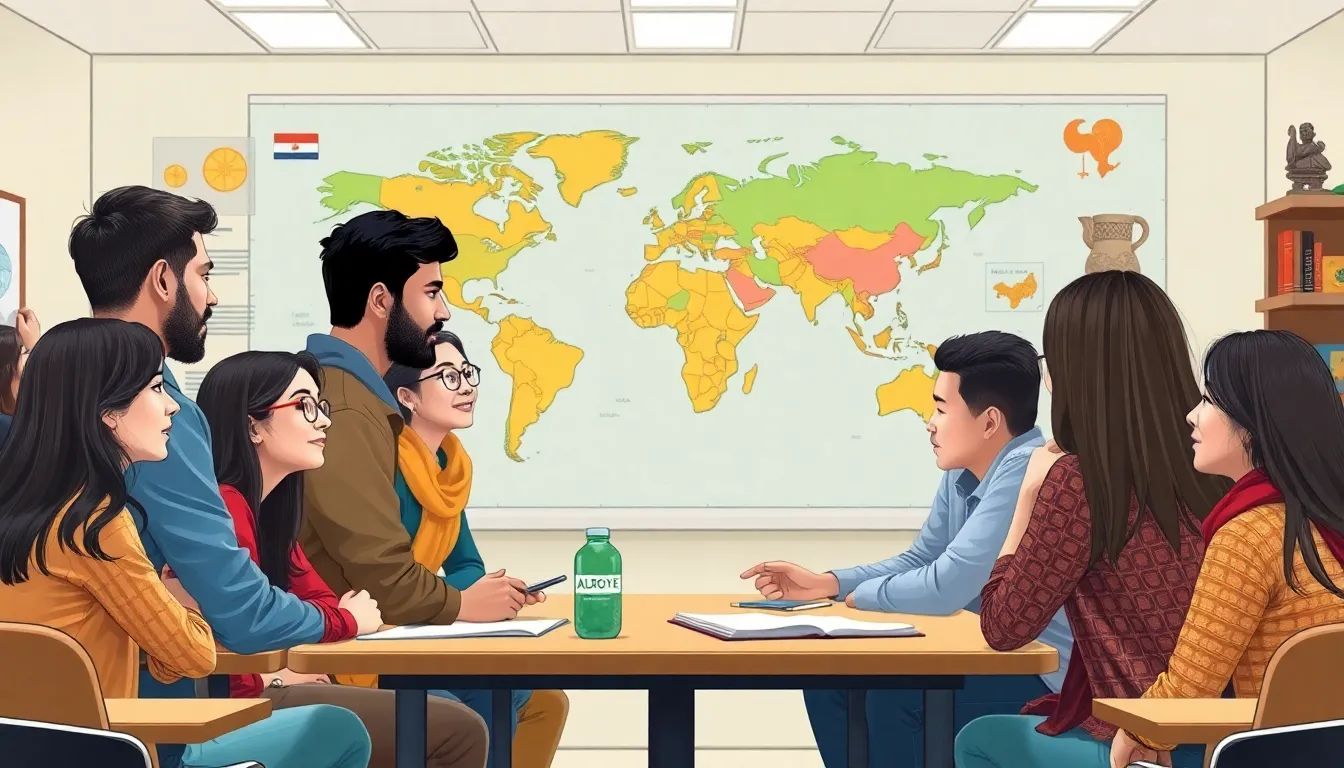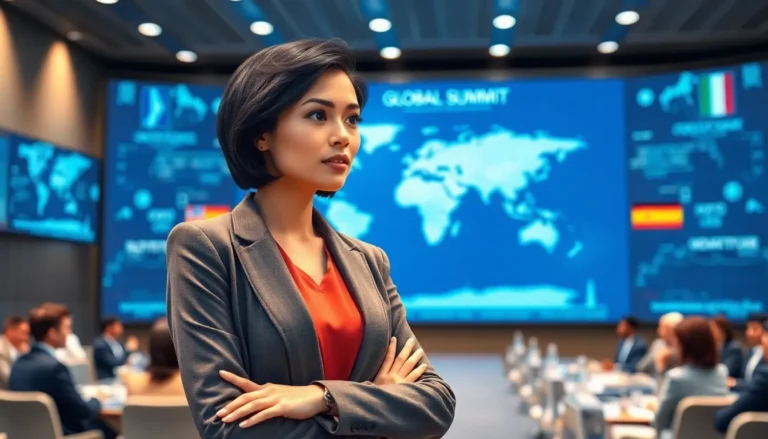In a world where global events can turn on a dime, understanding international dynamics is more crucial than ever. A Master’s in Global Affairs isn’t just for the aspiring diplomat or the next United Nations superstar. It’s for anyone who wants to navigate the complex web of politics, economics, and culture that shapes our lives. Plus, who wouldn’t want to add “Master of Global Affairs” to their LinkedIn profile? Talk about a conversation starter!
Imagine diving into the intricacies of global issues while sipping coffee (or tea if that’s your thing) and debating the latest international crises. With this degree, you’ll gain the skills to analyze and influence global policies, all while keeping your sense of humor intact. So if you’re ready to tackle world challenges with a sharp mind and a witty comeback, a Master’s in Global Affairs might just be your ticket to making an impact.
Table of Contents
ToggleOverview of Global Affairs Masters
A Master’s in Global Affairs equips students with essential skills for understanding international relations. Programs focus on critical areas such as global politics, economics, and cultural dynamics. Graduates often pursue roles in diplomacy, international development, non-profit organizations, and private sector agencies.
Courses commonly include subjects like international security, human rights, and global governance. Capstone projects or internships typically provide hands-on experience in policy analysis or program implementation. The interdisciplinary nature fosters a broader perspective on global issues, allowing students to connect diverse concepts.
Networking opportunities arise through collaborations with experts in fields like diplomacy and international business. Institutions often host seminars, workshops, and events that enhance professional growth. Alumni networks can offer valuable connections for career advancement.
The demand for professionals with global expertise continues to grow across various sectors. Employment projections indicate a significant increase in roles involving international relations and policy analysis. Employers seek individuals adept at navigating complex global issues.
Funding options exist for students pursuing this degree. Scholarships and assistantships can alleviate financial burdens, making advanced education more accessible. Additionally, many programs offer flexible learning formats, such as online classes or part-time options, catering to working professionals.
Ultimately, a Master’s in Global Affairs not only enhances professional qualifications but also empowers individuals to make informed contributions to society and global development.
Key Skills Acquired

Graduates of a Master’s in Global Affairs develop a variety of essential skills that enhance their ability to navigate complex global landscapes. The program emphasizes analytical and cultural competencies that prepare individuals for impactful careers.
Analytical Thinking
Analytical thinking stands at the core of global affairs education. Students learn to evaluate and interpret vast amounts of data, distinguishing between relevant information and noise. They assess international policies critically, allowing for informed recommendations on political or economic strategies. Engaging in case studies and simulations cultivates the ability to foresee potential challenges and solutions. Developing these skills enables graduates to contribute meaningfully to policy discussions and strategic planning. Graduates often utilize analytical tools to dissect issues, ensuring a robust approach to problem-solving in international contexts.
Cultural Awareness
Cultural awareness serves as a vital skill for those studying global affairs. Understanding diverse perspectives promotes respectful engagement and collaboration across various contexts. Students immerse themselves in different cultures through coursework and interactions with international peers, fostering open-mindedness and empathy. Exposure to global case studies enhances their ability to recognize cultural nuances that influence international relations. Graduates often apply this awareness in diplomatic roles, aiding in conflict resolution and fostering cooperation. Cultivating cultural sensitivity ensures graduates effectively address international issues with respect for local customs and traditions.
Career Opportunities
Graduates with a Master’s in Global Affairs find diverse opportunities across various sectors. With skills in international relations, they can significantly impact global initiatives and policies.
Government Positions
Government agencies actively seek professionals equipped with global expertise. Roles in diplomacy, intelligence analysis, and foreign service are common. Graduates often work as policy advisors, navigating complex international issues. They can also engage in program management, overseeing initiatives that promote international cooperation. Additionally, positions in local or national governments focusing on foreign policy development attract those with this advanced degree.
Nonprofit Organizations
Nonprofit organizations value the analytical and cultural skills that graduates bring. Positions often focus on international development, human rights advocacy, or environmental sustainability. Graduates work as program coordinators or grant writers, securing funding for global initiatives. They may also lead outreach efforts, connecting communities with resources and support. Furthermore, engaging with stakeholders at all levels enhances the effectiveness of nonprofit missions.
Private Sector Roles
The private sector increasingly employs graduates to address international business challenges. Companies look for expertise in areas like global marketing, risk assessment, or corporate social responsibility. Professionals might act as international business consultants, helping organizations navigate foreign markets. They may also work in compliance, ensuring companies adhere to regulations across borders. Leadership roles in multinational corporations often require the strategic insight that global affairs graduates possess.
Top Programs Worldwide
Numerous institutions offer exceptional Master’s in Global Affairs programs. These programs prepare students for influential roles in international arenas.
Program Highlights
Notable features define leading programs. Faculty members often include experts with real-world experience in diplomacy and international relations. Students engage in intensive coursework covering global politics, economics, and cultural studies. Many programs emphasize practical experiences, with opportunities for internships or capstone projects. Networking events featuring guest speakers from various sectors enhance learning and connections. Programs may also offer dual degrees, allowing students to combine their interests in related fields. Graduates leave equipped with analytical capabilities, cultural awareness, and problem-solving skills essential for their careers.
Admission Criteria
Admissions standards vary across institutions but generally follow similar guidelines. A bachelor’s degree is typically required, with a competitive GPA bolstering applications. Applicants often submit letters of recommendation from academic or professional references. A personal statement showcasing motivation and career aspirations plays a crucial role in admissions decisions. Some programs may require standardized test scores, such as the GRE, while others offer waivers under certain conditions. Relevant work or volunteering experience enhances candidates’ profiles. Fluency in multiple languages can also provide a significant advantage in the selection process.
Pursuing a Master’s in Global Affairs opens doors to a world of opportunities. Graduates emerge equipped with critical skills that are essential in today’s interconnected landscape. They’re not just prepared for careers in diplomacy but also excel in various sectors, making meaningful contributions to global initiatives.
With an emphasis on analytical thinking and cultural awareness, these programs foster a unique perspective that enhances one’s ability to navigate complex international issues. As global dynamics continue to evolve, the demand for skilled professionals remains high. Investing in this degree can lead to a fulfilling career while empowering individuals to make a positive impact on society.









